“Extra preparation and a reliable guide” are essentials
Famed War Photographer Yoichi Watanabe
speaks with Robert Walters Japan Managing Director Jeremy Sampson
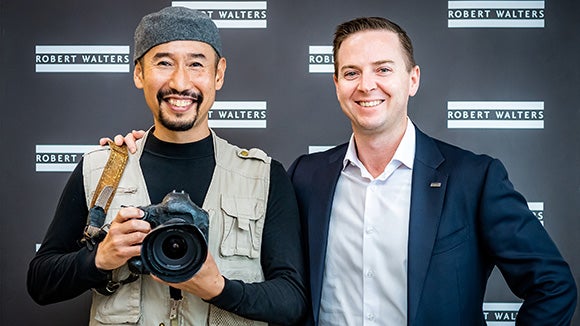
“Extra preparation and a reliable guide” are essentials
As a war photographer, Yoichi Watanabe is always standing at the forefront of world events, and continually works to provide information about global current affairs. Despite severe conditions, he travels across numerous locations around the world and continues to undertake new challenges in a wide range of different environments. In his work, he always takes care to maintain respect for his subjects and make adequate preparations. Jeremy Sampson, Managing Director at Robert Walters Japan, spoke to him about taking on challenges in an area that you are passionate about— a topic that has much in common with changing to a job in a global environment.
Passion in his university years brought him to his lifetime career
"What made you decide to work in harsh environments as a war photographer?" In a relaxed tone, Watanabe began his response to Sampson's opening question.
"When I was in university, I learnt about hunting tribes in Africa during a lecture. Fascinated, I went to the continent with a desire to meet them in person. At that time, the Rwandan Civil War was taking place over a wide area following a conflict between two ethnic groups. I saw many children asking for help, but I couldn’t do anything to help them."
"I thought seriously about what I could do, and I remembered my love for cameras, which began when I was a child. I thought that photography could expose more people to what these children were going through, possibly sparking a change. With that, I began my career as a war photographer. As long as the world is plagued with war, and as long as there are children crying in areas of conflict, it is my duty as a photographer to leave records of these events. I work to take photographs that bridge the divide and make people notice what is happening. Seeing these children in the Rwandan Civil War left a deep and lasting impression that functions as a core component in how I perceive my work."
Watanabe pursued an area that he felt passionate about in his youth and went on to make it his lifelong career. In contrast, Sampson related his own experience, noting that people can sometimes notice the work that they feel passion for at a later stage in their lives.
"I read business studies in university, but I had no idea that I would be passionate about my current line of work until I first entered the recruitment industry. It is wonderful to find a career path by chasing what you feel passionate about during your youth. But you may also come to find a job later in life that you are passionate about. It is crucial to be prepared so that you can accommodate this change when it happens, and then work to make the next step in your career."
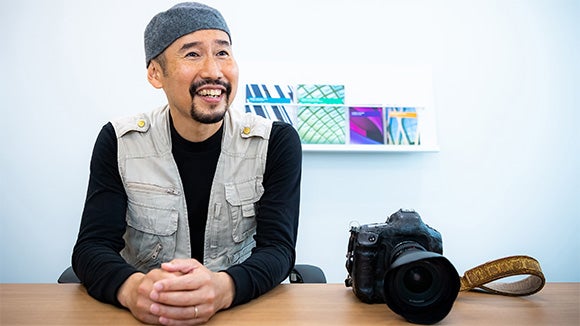
Respect is key for building trust
Describing what drives him to visit locations around the globe, Watanabe says, "The more places I travel to, the more I encounter differences in religion, ethnicity, lifestyle habits, and other areas. These differences leave a shocking impression that deeply affects me, and they fuel my desire to keep working."
"I was slightly nervous with excitement about speaking to you today, knowing that you come from Australia. I have the impression that Australia is at the forefront when it comes to diversity. Would you agree?"
Managing Director Jeremy Sampson spoke about his own experiences as he answered Watanabe's question.
"People in Australia come from a wide range of ethnicities and may hold different values. In Australia, you cannot tell someone's nationality from their looks alone. I speak with people from many backgrounds as part of my work. I always make sure to relate to each person as an individual, rather than classifying them based on their country of origin. Similarly, when Japanese people go to work at foreign-owned companies, it is vital to build a relationship of trust that goes beyond differences in nationality or culture. In order to achieve this, it is important to be open-minded and to have no fixed preconceptions."
"Here at the Tokyo office of Robert Walters, we have people of over 40 different nationalities all working together. All of them are individual and unique, but they are also equals. They respect one another as they carry out their work. In order to achieve seamless progress when working within a multilingual and multicultural environment, we need to approach each other with sincerity as we work with honesty. It is also vital for everyone to hold respect for each other's cultures."
Watanabe agreed, replying, "I think the most important word there is 'respect'." He continued by describing his own philosophy.
"One core aspect in my approach to taking photographs, whatever country I am in, is to have respect. Whenever I go to another country, I make sure to follow that country's rules and customs when taking pictures. Rather than starting to shoot as soon as I reach the location, I take my time and make sure to spend awhile living there while I take photographs. I do not simply barge in. Whatever the region, I always pay respect and make sure to be humble as I am coming in from outside in order to take these pictures."
Sampson expressed his agreement: "When working on the global stage, it is necessary not to have any fixed ideas, and relate to others as human beings while maintaining respect for their values and culture."
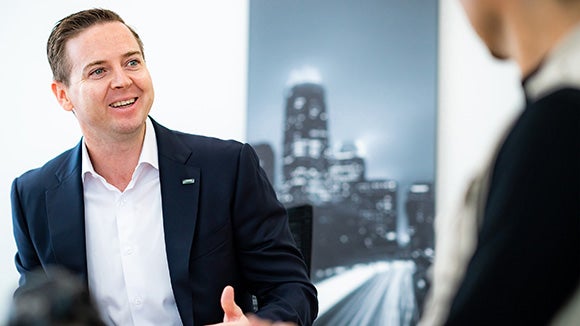
The secret to success is 80% planning and 20% technique
Yoichi Watanabe's work constantly involves risks and presents situations that require him to make difficult decisions. He emphasised the importance of preparing in advance, saying about 80% of his work in war reporting involves crisis management.
"I need to check and double-check the information that I have gathered, maintain close communication with contacts on site, and secure multiple evacuation routes in case of an emergency. I spend about 80% of my effort and funds on crisis management. The remaining 20% goes towards photography and interviewing techniques when I arrive at the location, as well as methods for getting around on site. All in all, it is 80% planning and 20% technique. This is how I divide my resources when working to cover conflicts." Watanabe also spoke about how he could become injured or even die if he does not prepare sufficiently.
"When interviewing and taking photographs, it is extremely important to carry out crisis management, and construct plans in order to prevent such situations from happening. I would never just dive into a location on my own. On the front lines, I need local war-zone guides and interpreters who can speak the language with the correct regional accent, as well as security in case something goes wrong. When working and moving around, I always assemble a team with a minimum of four people. If the guide tells me that I should not go any further, I make sure to listen and not take a step further. Even if I had been in that area over 50 times before and was sure that I could take a quick photo, I would never move ahead if my guide advised me to stop. I always pay particular attention to following advice from people who come from the area when covering war zones, and especially when going to the front lines."
Sampson noted: "It is also crucial to prepare when changing jobs. We work as a team to support people looking for new positions, and in this way, we have a role that resembles the guides that accompany photographers."
"You spoke about the need for preparing in advance, setting priorities, and working according to a rigorous plan in order to achieve goals. This also holds true for people considering changing jobs. It is vital to thoroughly research and assess the characteristics of the company and workplace environment before taking up the challenge."
"Changing jobs involves an undertaking within a new environment, and so you need to make many choices based on many kinds of information and a wide variety of options. We offer help in finding the way during that process. To reduce the risk of making an incorrect decision or spoiling an interview with your ideal company due to a lack of preparation, we offer suitable information and advice to guide people."
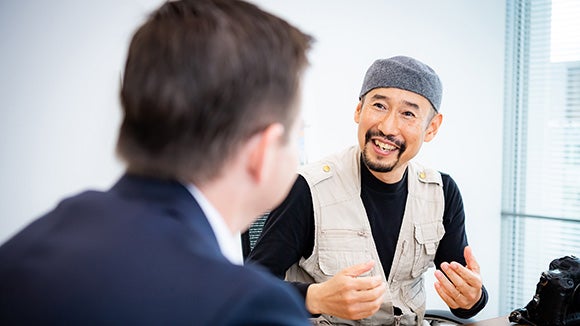
Long-term relationships lead to success
Watanabe explains that he places most consideration towards the relationship with his guides during preparations for visiting conflict areas.
"You cannot expect to go into the country and immediately be able to team up with that person. Whether I am in Iraq or Lebanon, if I come across individuals who I am interested in working with, I will visit them in their home. As I come to see them several times, I begin to get a feeling from how they behave towards their family. I make the decision on whether it is suitable to work with them based on these interactions."
"If I feel that I can respect an individual or that they are a wonderful person, then I will almost always ask them to join my team. When you form a team with these kinds of people, they will be able to work with you again if you go to cover the area after one year, five years, or fifteen years— not just on a one-off basis. At the start when I was in Lebanon, I was single and so was my guide. He later got married and became a father. By staying together for a long time in this environment, my guide felt like more than just a partner in my work; he became a friend who truly felt like as family."
Sampson pointed out similarities with his field. "Our work is to guide people who are looking to take on challenges at a new job, and we also need to build long-term relationships in our work as well."
"You could say that the fostering of long-term relationships is a vital aspect for success in any industry. People thinking about a new job who come to visit Robert Walters are always greeted with hospitality, as if we are inviting them to our own home. We take a long time to discuss a wide range of topics, such as their background, what inspires them, their interests in terms of career options, and their concerns or worries. Through this process, we work to build a relationship of trust between us. We have maintained extremely long-lasting connections with some people who have come to seek advice. We have even kept in contact with a few individuals for 10 or 15 years. Furthermore, we meet these people and engage with them on a personal level by offering counselling that caters to each person's needs and background."
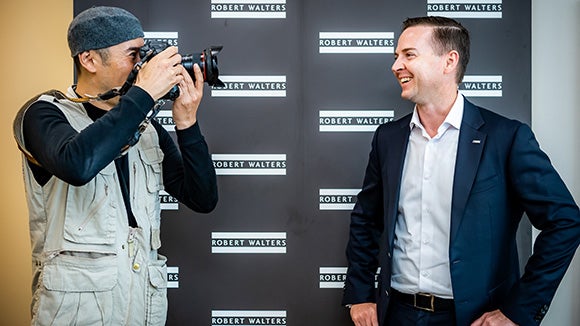
"Go on a journey": be prepared and set off to take on new challenges
Yoichi Watanabe strives to make careful preparations and build strong relationships of trust before he starts working to take photographs and conduct interviews. He told Jeremy Sampson about the importance of trusting his own instincts and taking on challenges with a motto of going for opportunities rather than being indecisive.
"It does not matter if you do not achieve anything after going; the important thing is that you have tried. This process works to develop new connections. It is important to head out to see and listen to things, even if you cannot actively speak out or do something."
Watanabe continues to take on new challenges around the world. He chose the phrase "Go on a journey" as a message for people looking to build their future lifetime careers.
"Go on a journey. I hope that this phrase can help people come across new, far-reaching opportunities. Taking on a challenge in something out of the ordinary is like going on a journey. Similarly, engaging in a job that you feel passion for is also a kind of journey. I am confident that my future journeys will bring me more strength from here on out."
Sampson expressed similar sentiments. "If someone is standing at a crossroads in life and is wondering whether to remain in the same place or to take a challenge on a new path, I think that it is better to choose the latter option. As demonstrated by how you have discovered surprising and exciting things as you travel around the world, I am convinced that the world and our lives are filled with many possibilities. We will work as partners and lend an ear to anyone seeking to challenge their horizons in a new job. 'Go on a journey.' I couldn't think of a better phrase for it."
